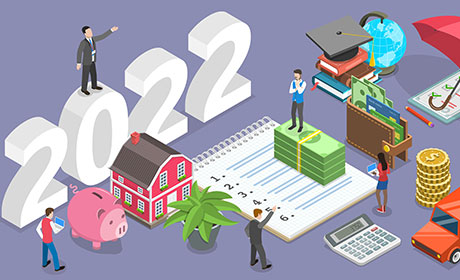There is no reason why personal tax planning should be left to the last minute, and completing your planning early ensures you don’t miss out on valuable allowances which are otherwise lost. You can:
- Use the capital gains annual exemption of £12,300 for 2022/23 – it can’t be carried forward or transferred to another person (such as your spouse)

- Contribute to your ISA – the ISA allowance for 2022/23 remains at £20,000 and the Junior ISA allowance is £9,000 (for children under 18). If you’re eligible, consider contributing up to £4,000 to a Lifetime ISA which carries a £1,000 bonus, but there are penalties for early withdrawal. ISA allowances cannot be carried forward.
- Maximise the pension annual allowance of £40,000 (but tapered down for someone earning over £240,000 to a minimum of £4,000). You can carry forward unused pension annual allowances for up to three years, so the 2019/20 allowance needs to be used by 5 April 2023.
- Use stakeholder pensions for non-earning spouses and children – contribute £2,880 and effectively receive £720 free.
- Use the inheritance tax gift exemption of £3,000, which can be carried forward one year.
- Consider transferring income producing assets to the lower earning spouse to utilise their personal allowance and lower tax bands. By doing this early, it allows for more of the tax year to generate the sufficient income to fully utilise the personal allowance and lower tax bands. Someone could generate £42,370 tax-free per annum by simply using all their tax allowances.
- Submit claims for overpaid tax and capital losses relating to the 2018/19 tax year before 5 April 2023, after which such claims would not be allowable.
- Consider completing Venture Capital Trust (‘VCT’) or the Enterprise Investment Scheme (‘EIS’) forms early, so that any tax repayment can potentially be made sooner, or relief can be carried back to the previous tax year.
- File your 2021/22 Self-assessment tax return – if you think are due a tax repayment, file your tax return as soon as possible so that you receive the refund. If you had to make advance payments on account for 2021/22, it makes sense to file your tax return before 31 July 2022, so that the second payment on account could be potentially reduced. Finally, filing your tax return early limits the time window that HM Revenue & Customs (‘HMRC’) have to raise an enquiry into your return – HMRC have one year from the filing date of your tax return to issue their enquiry.
- Make any charitable donations in 2022/23 before filing your 2021/22 tax return and you can decide whether you want to carry back the donation to 2021/22 to achieve the tax relief earlier.
This material is not tax, legal or accounting advice and should not be relied on for tax, legal or accounting purposes. Quilter Cheviot Limited does not provide tax, legal or accounting advice. You should consult your own tax, legal and accounting adviser(s) before engaging in any transaction.
Author
Subscribe to one of our newsletters
Get the inside view from Quilter Cheviot delivered straight to your inbox.